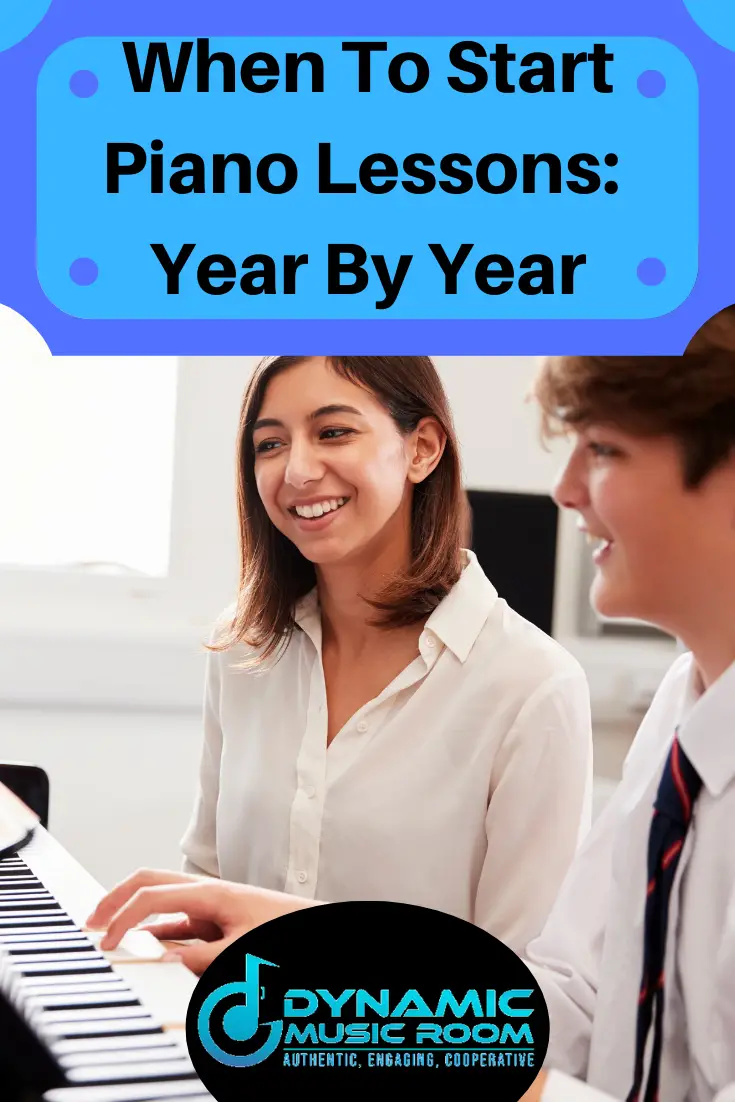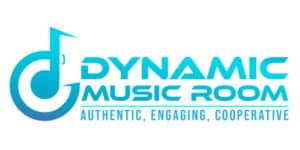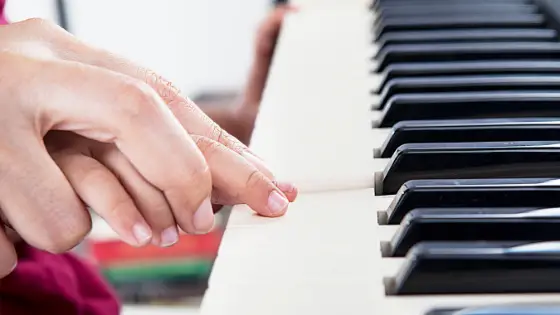Are you thinking about starting to learn piano, but you’re wondering if the boat has sailed?
Do you have a child interested in learning piano, but you’re unsure if they’re the right age?
As a music teacher, I’m asked this question in some form by many people. I decided to spell it out here for anyone who needs to know when to start piano lessons.
The short answer is: start piano lessons at any age when the learner is interested. For adults, it’s never too late to learn (if you develop the right practice skills which is easy). Young learners need to be able to focus for short periods of time while practicing.
Look ahead for reasons to learn piano, a year by year breakdown of when to start learning piano, and tips for adult learners.
Note: This article is focused on all learners and when to start piano lessons. For detailed considerations on children learning piano, check out when your child should start piano lessons (coming soon).
Table of Contents
Reasons To Learn Piano
Learning any instrument is an amazing hobby and expressive practice in life, and the piano is one of the more easily accessible ones out there.
There’s no shortage of resources, materials, programs, or teachers out there, and the piano has remained one of the most popular and iconic musical instruments since its invention in the 18th century.
Here are a few important reasons to learn the piano at any age.
Increases Concentration Abilities
Piano playing requires independent h and motion. This is difficult at first, but from my 10+ years as music teacher I know it’s learnable at any age.
As you develop independent skills, your brain is actually gaining concentration abilities. This applies to anything in life and is key in the youngest and oldest learners.
Easy To Create Good Sound
While the piano may seem tricky to play, it’s actually easy to create good sound. Almost any song may be broken down into its basic elements to play and sound good.
Unlike guitar which needs strings pressed and held down to sound or a wind instrument which requires correct air, lip shape, and fingerings, the piano sounds good just by pressing down the key.
Strengthens The Brain: Neuroplasticity
Playing any instrument does one of the most amazing things to your brain by stimulating neuroplasticity.
This fancy word means the brain’s neurons are engaged more actively to develop and build connections throughout the whole brain.
This results in higher brain function, better memory, and quicker learning of anything!
In fact, this benefit is well-researched and used to help people. This study on neuroplasticity effects of music on those with trauma showed that music-driven therapy (which included playing piano) improved biological indications and outlook to the point where some neurological effects of trauma were reversed.
My host teacher had a stroke towards the end of his career, and he played recorder as part of his therapy. His recovery amazed doctors, and his scans showed little to no evidence he had even had a stroke months after having one.
Practice Fine Motor Skills
The piano requires fine motor control. With younger learners, practicing these fine motor skills is one of the key development areas.
With adult learners, this is still an important area to practice. If you don’t use it, you will lose it.
Even those with arthritis who play report slowed effects of these diseases, though they may need to play in shorter periods (speaking as someone with rheumatoid arthritis, I can attest to this personally).
Improves Mood
Playing piano helps people regulate their mood better. This happens in two big ways.
- Playing piano releases “happiness” hormones which result in improved mood.
- Playing piano awakens the brain and allows it to better process situations and regulate its processes even if the player isn’t directly thinking about the situation.

When Should You Start Piano Lessons? Year By Year Breakdown
It’s generally well-accepted playing piano is just awesome for anyone, but when can you start piano lessons? When is it too late?
Answers: It’s never too late, but it may be too early.
Anyone at any age can start to learn piano, but there are different considerations which I’ll dig into in this section.
Birth – 2 Years Old
I don’t recommend signing up these kids for piano lessons. They don’t have the motor control or attention span in almost every case.
Just be patient.
If you still want to give them piano exposure, play piano for them or have them listen to/watch videos of the piano being played.
Also, allow them to play on a keyboard or piano. Now is the perfect time to start reinforcing “nice” playing over pounding on the keys.
3-4 Years Old
Even at this age, I still don’t recommend these kids start taking piano lessons. While they’re developed enough to start learning (and many ones at this age will get quite good), it’s a fine line to walk at this age.
They don’t always have the focus to succeed in this. It’s going to be up to the parents and the instructor at how successful the lessons will be.
If you are pursuing lessons at this age, do a lot of research on the lesson teacher and make sure they’ve worked with kids this age before with success.
Still, expose them to piano playing and help them learn to respect the keys; they won’t fall behind if you wait.
5-6 Years Old
It’s at this age you may seriously consider whether to start piano lessons or not. Ask yourself if the child is interested in learning and consider looking into a lesson teacher who specializes in working with kids.
One of the important elements to look for is if the child can pay attention and focus on one thing for 15 minutes at a time.
In general, though, my recommendation is to have the child wait until the next age group. It’s still hit or miss whether this will end up as a good experience for the child.
The child won’t be “behind” much on learning piano. It may seem like they are compared to those who started as a toddler, but in my experience, they end up about the same by the end of high school.
7-8 Years Old
This is the age I recommend starting lessons. There’s not much to be gained starting earlier, but if the child has a poor experience before this age, they likely won’t ever want to try learning again as a kid.
At this age, students have developed enough fine motor control, focus, and aural awareness they will succeed fairly quickly at piano.
Warning! Make sure your child is actually somewhat interested in learning piano. Don’t force it, or they may end up hating music altogether.
Still, look for a lesson teacher with experience working with this age group.
Parents should be involved in their child’s piano learning in the following ways:
- Providing consistent practice times (10-15 minutes per day)
- Communicate with the teacher about the student’s expectations
- Block off lesson time as sacred and keep the student going consistently
- Be encouraging and understanding at all times; save the critique for the teacher even if you’re a musician yourself
- Take time to listen attentively to some of the student’s practice sessions; they’ll notice you care
Learn more about how to memorize piano keys.
10-13 Years Old
This is another great time to start piano lessons, though this age comes with its own set of issues.
This age group learns and improves quickly. They have ample attentiveness and coordination.
Parents should follow the tips in the last section for this one as well.
But there are two big things to watch for on top of everything else:
- Learners at this group are more sensitive to critique (stay positive)
- Peer pressure is more likely to affect this age group; encourage them to stick with it because they like it and don’t let anyone else affect their opinion
14-18 Years Old
Students at this age gain a lot of piano lessons. It’s still not too late for them to get skilled at the piano (it is never too late, actually) though they may have a hard time catching up with those who started younger.
But honestly, you should learn piano because it makes you a healthier and happier human being, not to become a piano professional (though if you do that’s great too!).
This age group is extremely successful in lessons IF they are allowed to consistently practice. With more activities coming in this age group, it’s difficult for many to block out the time to practice.
But it’s essential for improvement. Consistency is 100 times more effective than anything else.
For example:
- 1 person practices 105 minutes once per week
- 1 person practice 15 minutes every day
Same amount of time, same progress, right?
Wrong!
The second person will improve dramatically over time compared to the other. Spread out time allows for the brain to develop better knowledge and skills.
Check out what the black keys are on a piano.
19-99 Years Old
It’s never too late to learn piano!
Older learners can learn quickly and even get quite good no matter what age the start.
But in reality, most older beginners quit much faster than younger people.
Why?
There are many reasons, but the core of it is frustration.
Adults don’t like to be bad at things. We’re adults; we should be better than kids, right?
Nope, everyone who starts, starts from square one. This is a bitter pill to swallow, I know.
I’m a trained musician and music teacher, but when I first picked up the guitar as a new instrument, I was terrible.
But I knew how practice would make me improve. I stuck with it and got better.
It’s the same with adults. You will improve and become skilled.
You will learn faster than kids in some ways. Honestly, you’ll learn slower in others (ear training; aural skills).
But it’s easily done if you stick with it.
Look at the next section for tips on sticking with learning piano.
Tips For Sticking With It
Learning something new like the piano is tough, but anyone can do it if they stick with it. Here a few of my favorite tips for helping you or your child stay on track.
Limit Your Practice Sessions
New players easily fall into the trap of trying to practice for hours at a time.
Don’t do it!
Practicing is good, but consistent practicing is better. Limit yourself to shorten sessions throughout the day.
This is better for your brain and for your motivation.
Find A Goal Song
The end goal is to be able to play piano better. Pick a song you love and want to learn.
It may take you a while to learn the song, but keep it in mind as you learn and improve.
You’ll be able to more easily see how the technical exercises help you towards the goal.
Mine was a piano arrangement of House of the Rising Sun and the 2nd movement of the Pathetique Sonata by Beethoven.
Connect With Other Students In Your Level
It’s easy to feel isolated when learning. You may feel like you’re the only one in the world struggling.
You’re not!
Connect with other players at your level (and similar age). Online forums and groups around you are good to connect with.
Give Yourself Grace
Yeah, learning piano is tough at times. Give yourself time and patience to improve.
At first, you’ll feel like you’re making leaps and bounds, and then there’s a huge period where it feels like you’re not making any progress.
It’s not true. You ARE improving; it’s just harder to see.
Give yourself an honest shot of at least 6 weeks of daily 15 minute practice before judging yourself.
Better yet, record yourself attempting to play a simple song in the first week. Then record yourself at 6 weeks on the same song.
You’ll be amazed at the progress and motivated to continue.
Stop When You’re Frustrated
This piece of advice shocks a lot of people.
When you get frustrated, stop and walk away from the instrument. Nothing good will come from forcing yourself to practice while upset.
In fact, your brain will begin to associate piano negatively.
Conclusion
I hope you find this article on when to start piano lessons helpful for you, your students, or your child.
Start now! Anyone can learn!
Contact your local music teacher or music store for information on taking piano lessons. Or look for a proven piano learning program.
The one I recommend is Flowkey. It has a massive song list, great practice tools, and a thorough series of courses for all levels of learners (and it’s free to try out).
I’m an affiliate for them, and I truly believe this is one of the best piano learning online programs out there for a reasonable price.


